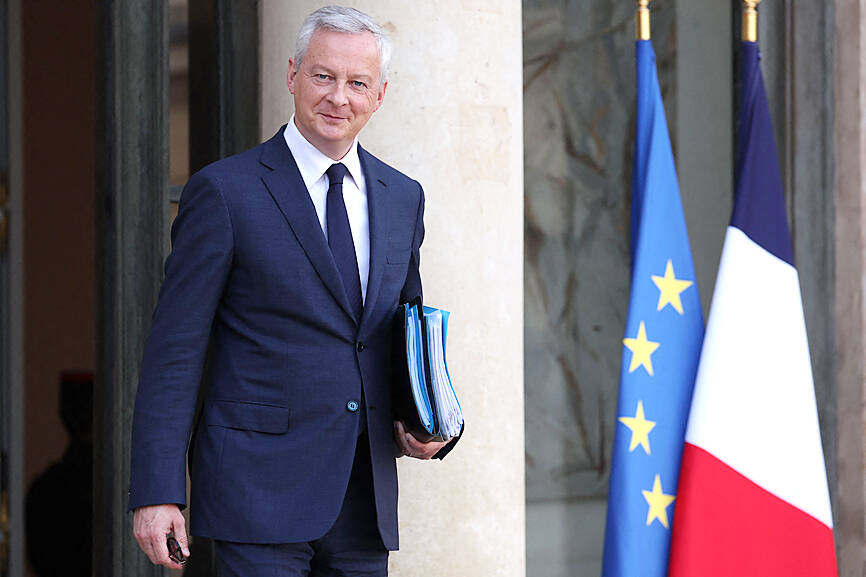French Minister of Finance Bruno Le Maire stepped up demands for the EU to take swift and firm action in response to the climate provisions contained in US President Joe Biden’s new spending initiative.
France is concerned that several provisions in the US Inflation Reduction Act discourage investment in the EU and discriminate against European companies, particularly tax credits for US-made electric vehicles (EVs).
Le Maire said “firm and proportionate” options could include stricter environmental rules, measures to ensure preference for European production, or an acceleration of reciprocity rules. Asked if Europe could lodge a complaint with the WTO, he said the continent should use all options available.

Photo: AFP
“We must react fast. I’m calling for a united, strong and coordinated response from the EU to our American allies,” Le Maire said in an interview with Les Echos. “Only a hard line will allow us to get results.”
The US and the European Commission created a task force last month to try to resolve their disagreements, European Commissioner for Internal Market Thierry Breton said on BFM Business radio.
The EU has presented a letter to that forum with specific points that it believes contravene WTO rules.
“Either they will be resolved there — and we hope they will, that’s why we have the task force, to discuss this — or we will have to go to the WTO and envisage retaliatory measures,” Breton said.
Le Maire said he is struggling in negotiations for investment from a foreign company in the EV sector as the US is ready to offer four times the amount of subsidies.
In total, France estimates that about 10 billion euros (US$9.98 billion) of investment and 10,000 jobs are at stake.
“There is a risk of a major shock for French and European industry,” Le Maire said.
Japan joined the EU in calling planned US aid for local EV manufacturers “discriminatory,” and demanded equal treatment for the nation’s automakers.
The country’s auto industry might hesitate to invest in the electrification of vehicles in the world’s largest economy if the US offers “discriminatory incentives” to local manufacturers, Japan’s government said in a statement on Friday.
“This could cause negative impacts on the expansion of investment and employment in the US,” it said.
A multinational dispute has been raging over the recently passed US Inflation Reduction Act and subsidies to be provided through it to support green technologies in the country. The EU, South Korea and other trading partners see the aid as unfair.
The US should give Japan “treatment no less favorable” than North American countries regarding requirements concerning the final assembly of vehicles, critical minerals used for their manufacture and their battery components, the statement said.
The requirements of the EV tax credit are “not consistent” with the US and Japan’s shared policy to work with allies and like-minded partners to build supply chains, the Japanese government said, adding that the provisions “preclude Japanese businesses from enjoying the benefit.”

TECH CLUSTER: The US company’s new office is in the Shalun Smart Green Energy Science City, a new AI industry base and cybersecurity hub in southern Taiwan US chip designer Advanced Micro Devices Inc (AMD) yesterday launched an office in Tainan’s Gueiren District (歸仁), marking a significant milestone in the development of southern Taiwan’s artificial intelligence (AI) industry, the Tainan City Government said in a statement. AMD Taiwan general manager Vincent Chern (陳民皓) presided over the opening ceremony for the company’s new office at the Shalun Smart Green Energy Science City (沙崙智慧綠能科學城), a new AI industry base and cybersecurity hub in southern Taiwan. Facilities in the new office include an information processing center, and a research and development (R&D) center, the Tainan Economic Development Bureau said. The Ministry

ADVERSARIES: The new list includes 11 entities in China and one in Taiwan, which is a local branch of Chinese cloud computing firm Inspur Group The US added dozens of entities to a trade blacklist on Tuesday, the US Department of Commerce said, in part to disrupt Beijing’s artificial intelligence (AI) and advanced computing capabilities. The action affects 80 entities from countries including China, the United Arab Emirates and Iran, with the commerce department citing their “activities contrary to US national security and foreign policy.” Those added to the “entity list” are restricted from obtaining US items and technologies without government authorization. “We will not allow adversaries to exploit American technology to bolster their own militaries and threaten American lives,” US Secretary of Commerce Howard Lutnick said. The entities

Minister of Finance Chuang Tsui-yun (莊翠雲) yesterday told lawmakers that she “would not speculate,” but a “response plan” has been prepared in case Taiwan is targeted by US President Donald Trump’s reciprocal tariffs, which are to be announced on Wednesday next week. The Trump administration, including US Secretary of the Treasury Scott Bessent, has said that much of the proposed reciprocal tariffs would focus on the 15 countries that have the highest trade surpluses with the US. Bessent has referred to those countries as the “dirty 15,” but has not named them. Last year, Taiwan’s US$73.9 billion trade surplus with the US

The Taipei International Cycle Show (Taipei Cycle) yesterday opened at the Taipei Nangang Exhibition Center, with the event’s organizer expecting a steady recovery in the industry this year following a tough last year. This year, 980 companies from 35 countries are participating in the annual bicycle trade show, showcasing technological breakthroughs and market development trends of the bicycle industry at 3,600 booths, the Taiwan External Trade Development Council (TAITRA, 外貿協會) said in a statement. Under the theme “Ride the Revolution,” the exhibition has attracted more than 3,500 international buyers from 80 countries to preregister for the four-day event, which is expected to